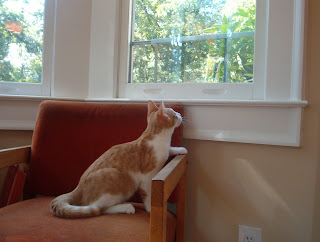Everyday they looked at that garden. It was rough and grassy because it was made in the prairie sod, but all the tiny plants were growing. Little crumbled leaves of peas came up, and tiny spears of onions. The beans themselves popped out of the ground. But it was the little yellow-bean stem, coiled like a spring, that pushed them up. Then the baby bean-leaves, and the beans unfolded flat to the sunshine.
Pretty soon, they would all begin to live like kings. From Little House on the Prairie by Laura Ingalls Wilder.
Like many children, I adored the "Little House" series of books written by Laura
Ingalls Wilder. For me, there was something enchanting about the
Ingalls family's sometimes hard, and always self-reliant existence. Ma and Pa
Ingalls seemed to be able to do anything, from building a house to making cheese. Even Mary and Laura could churn butter. Of the series, I liked
Farmer Boy well enough. but somehow the story of
Almonzo Wilder's adventures on a prosperous farm, where there was always more than enough to eat, just didn't capture my imagination in the same way as did the
Ingalls' ongoing
struggles and joys carving out a life in the unpredictable but exciting wilderness of early America.
I mean, look at the drama involved in a bean plant starting to produce its buds and all the anticipation involved in watching the plant's growth. I think I always related to that.
Kings indeed.
I enjoyed a fairly sheltered, mostly suburban, certainly happy and satisfied childhood, and yet (or maybe because?) the idea of self-reliance was incredibly alluring. Certainly, most of the "hobbies" that I've taken up in recent years (knitting and crochet, cooking, gardening, bread baking) or are considering ( cheese making, brewing and wine making, canning, sewing, weaving, bee-keeping, poultry) are really life skills. I've come to feel that we do too much shopping and not enough making and tending. If that sounds old-fashioned, so be it, but give our forebears credit...they got by. Plus, they had a certain measure of control over their living situations. I think we might have misplaced the importance of that in favor of an easier ride.
I'm no survivalist. I don't want to stake out a piece of land and defend it with a gun. The type of self-
reliance I'm committed to is that which helps sustain community as well as oneself. Look out for yourself and your family, but do it in a community spirited way.
If you grow vegetables, you might think about starting a community "trade-off" . For example you make a deal with six or seven other gardeners, you grow all the tomatoes, another person grows all the peppers, another grows all the onions, etc. This isn't my idea. I'm borrowing it from Christina's wonderful blog
A Thinking Stomach. Check out the link here:
http://athinkingstomach.blogspot.com/2008_08_01_archive.htmlOr, if you can't garden yourself, you can join a
CSA (community supported agriculture). You're supporting local farmers and you
benefit from the fresh ( and usually cheaper) produce.
Or you can patronize local farmer's markets. It may seem more expensive at first, but remember, you're buying better quality both in taste and nutrition. Buying local helps to insure a healthy local economy. And not to be a doomsayer, but I think the day isn't long coming when the illusion of cheap food will vanish. I say illusion because America's relatively cheap food costs have been partially bolstered for years by cheap and readily available fossil fuels. I think that pretty soon we'll find that the tomatoes shipped from California will be as expensive, if not more so, as the local tomatoes available at the farmer's market. In February, that California tomato is going to be even more expensive (if you live in Georgia like me). It will be a
luxury item (although it still won't taste like one). So maybe we don't need to eat tomatoes in February? Or maybe you grew enough over the summer, or bought enough in August (from a farmer) to freeze or can?
We should pay what food costs. Times are tough and getting tougher and I worry about keeping and finding work, along with a lot of other people, but I am convinced that we need to make ourselves, and our communities, self-
reliant. That means, in part, being very particular about how we spend our money, and how better than buying from someone you know or can get to know? Sure you can save five or ten dollars going to
Wal-Mart, but, really, who are you helping there? You'll probably wind up walking out of the store with the "bargain" item plus a lot of other stuff you don't need and who
benefits from that? Not you, and certainly not the community that you are a part of.
So you might ask, if I'm so green - and apparently so bossy about it - why do I do container gardening exclusively? I realize that I am enormously blessed in actually owning an home. Let me also just say that I am not a huge fan of lawns. I think a little lawn is great for its
aesthetic value and if you are a fan of croquet nothing is better. Otherwise, it seems a little odd to me to use a large swath of land for one plant when you could be growing food. So why do I still have a lawn? Why don't I tear it out and plant vegetables? I have no weird neighborhood
covenants to deal with and my actual neighbors are pretty cool. Well...
Here's my backyard.

Here's the front.

As you can see, there's lots of space, but not much sun.
Here's a - sort of - exception.

I'm thinking that I could put in borders of
vegetables here that tolerate shade, mainly leafy greens, but true sun lovers like tomatoes and eggplants, and peppers are always going to be out of the question. So the deck is my garden for now. You do what you can. I've started herbs in the sunny strip at the side of the house and I might actually try a variety
of asparagus there called Jersey King, reputed to perform well in heavy clay soil, which Georgia has in
abundance. Of course with asparagus you have to wait at least two years to harvest, but after that the plant can produce a lush spring crop for twenty to thirty years.
That's what I call a good investment.
I'm currently dizzy with possibilities though. The election results have renewed, not only my faith in the democratic electoral process, but my own passionate commitment to community and maybe some increasing clarity around the fact that we live in a locality, but we also have a community that we are part of on the national and international levels as well. I'm especially inspired by Michael
Pollan's recent manifesto to the president elect published by the New York Times on
Octotober 9
th and
addressed to the "Farmer in Chief." This is a moving and eloquent document written, of course, before the results were in.
http://www.nytimes.com/2008/10/12/magazine/12policy-t.html?em
What is most striking, and I think what has many abuzz, is
Pollan's recommendation that our new president turn part of the White House lawn into a "victory" garden. Please read this wonderful piece of journalism. It's long, but
Pollan is such an engaging writer that it won't feel that way. I particularly love the image he suggests of the First Family engaged in tending the nation's exemplary vegetable garden. What a wonderful picture (and model) that would present for all Americans... and to the the rest of our community... the world.
Today's TwistLaura
Ingalls Wilder was an American author born in 1867, She is best known, of course, for her "Little House" series of children's books, the first,
Little House in the Big Woods, being published in 1932. Wilder had a career as a journalist prior to this, but there is still some controversy over the true authorship of the the novels. The consensus seems to be that while Wilder actually wrote the stories, her daughter Rose, (also a writer) edited them, perhaps re-writing them to a certain extent. Laura and Rose were both strong-minded women and their collaboration couldn't have been an easy one. Nonetheless, the result of that collaboration has provided
generations of readers with great pleasure.
Laura
Ingalls Wilder had, by many reports, an independent character (dare I say, self-reliant?) notable for the times and certainly evident in the young Laura presented in the books. Apparently, she was also competitive. In her late eighties, she declared that she would live until 90 simply because her husband,
Almonzo Wilder, had and he wasn't going to beat her. Sure enough, she made it. Three days after her 90
th birthday, Laura
Ingalls Wilder died on
Feburarary 10, 1957.



























